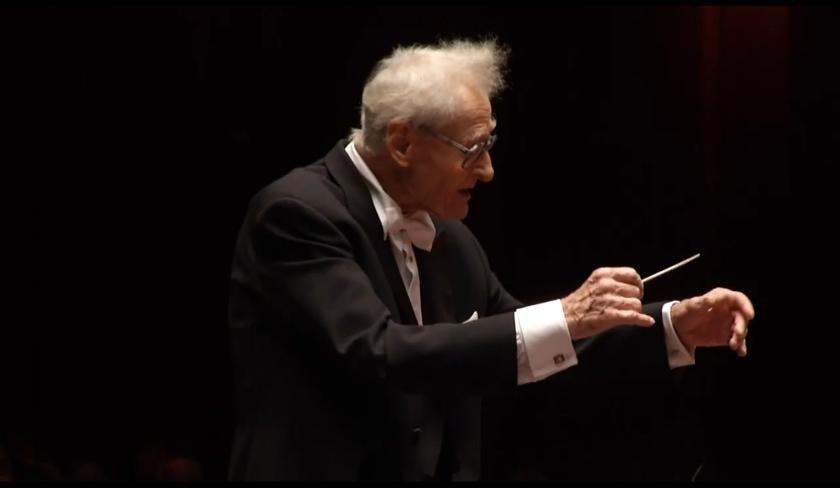Stanisław Skrowaczewski has become a legend in his own, considerable, lifetime. From the ecstatic ovation as he took the stage, it seemed many were here just to see this iconic figure in the flesh. Fortunately, the performance of Bruckner’s Fifth Symphony that followed fully justified the reception. The interpretation was vibrant and intuitive, with tempo and dynamic decisions seemingly coming from inside the music itself. A few imprecise textural details suggested that age is finally (at 92!) catching up with the great man, but those didn’t matter a bit. This was classic Skrowaczewski.
These days Skrowaczewski is a Bruckner specialist, and few other conductors can project a knowledge of Bruckner’s symphonies as comprehensive or sympathetic as we experienced here. He’s physically frail, short and stooped, his left shoulder hanging down far below his right. But he has an efficient and concise visual language that communicates everything he needs. And whatever his physical condition, he is always alert, commanding complete authority over the music. Tempos, while disciplined, are never static. Every beat is considered, and every tempo change anticipated and supply integrated. Skrowaczewski doesn’t grandstand, he doesn’t drive tuttis to ever-greater intensity, nor does he overemphasise contrasts. The tuttis have power, and the contrasts are clear, but he allows the music to speak for itself, giving the composer the space he needs to make his symphonic statements.
This was still an interpretation at the very highest level of inspiration
Much of the quieter music came across with a valuable, and all too rare, intimacy. The pizzicato section towards the start of the first movement, for example, had a conversational quality; an intimate dialogue between first and second violins. But then, as the drama grew towards the development, Skrowaczewski skilfully changed the scale of the music, subtly adding in the grandeur and weight at an almost imperceptible pace. For all the naturalness of his approach, Skrowaczewski never takes anything for granted, and always takes pains to bring out details that might otherwise be overlooked. Woodwind figures in louder passages are a particular focus of his attention. But this is where age is starting to catch up with him: he’s able to maintain the long paragraphs – the intensity and the focus of the bigger picture – but the dexterity required to cue these details as well sometimes eludes him.
There was little sentimentality in the Adagio, but plenty of expression and rubato. The LPO strings made the climaxes of the movement particularly stirring, Skrowaczewski’s broad phrasing combining with the players’ rich, silken tone and impeccable ensemble to captivating effect. Moving attacca into the scherzo was an effective innovation, the better to contrast the mood and tempo of the two movements. There was a surprising lack of bass in the main theme of the scherzo – Skrowaczewski is clearly more interested in propulsion from the upper strings than weighty momentum from below. The sheer energy of the music here was particularly impressive, again using small, efficient gestures to retain control of even this fast beat, subtly shaping the music from one bar to the next.
His interpretation came into its own in the finale. The opening, in which Bruckner quotes themes from the preceding movements, was unusually sectional, each phrase at a contrasting tempo, and with daringly extended silences between. But this was just the starting point in a narrative of unity and redemption, with the music’s sectional structure gradually giving way to longer, more even paragraphs, under the guiding light of the brass chorale. The chorale itself was surprisingly disciplined, the brass dynamics carefully controlled, and the last note of each slightly elided. Skrowaczewski seemed more interested in the quiet echoes that follow in the strings, the more human response to the brass’s voice from the heavens. Redemption was at hand, but not merely though divine intervention.
Even as the symphony drew to a close, Skrowaczewski continued to focus in on usually unheard details. As the marmoreal brass chords of the coda played out, he attempted to contrast them with a quieter figure in the woodwinds, even on the very last page of the score still taking nothing for granted. Again, the dexterity required to bring this out while closing the symphony was a little more than he could manage, but the effort didn’t make the ending any less of a success. This was still an interpretation at the very highest level of inspiration, a little rough round the edges, but with a profound message to share. At 92, Skrowaczewski is still the master of this music; most other performances seem trivial by comparison.













Add comment